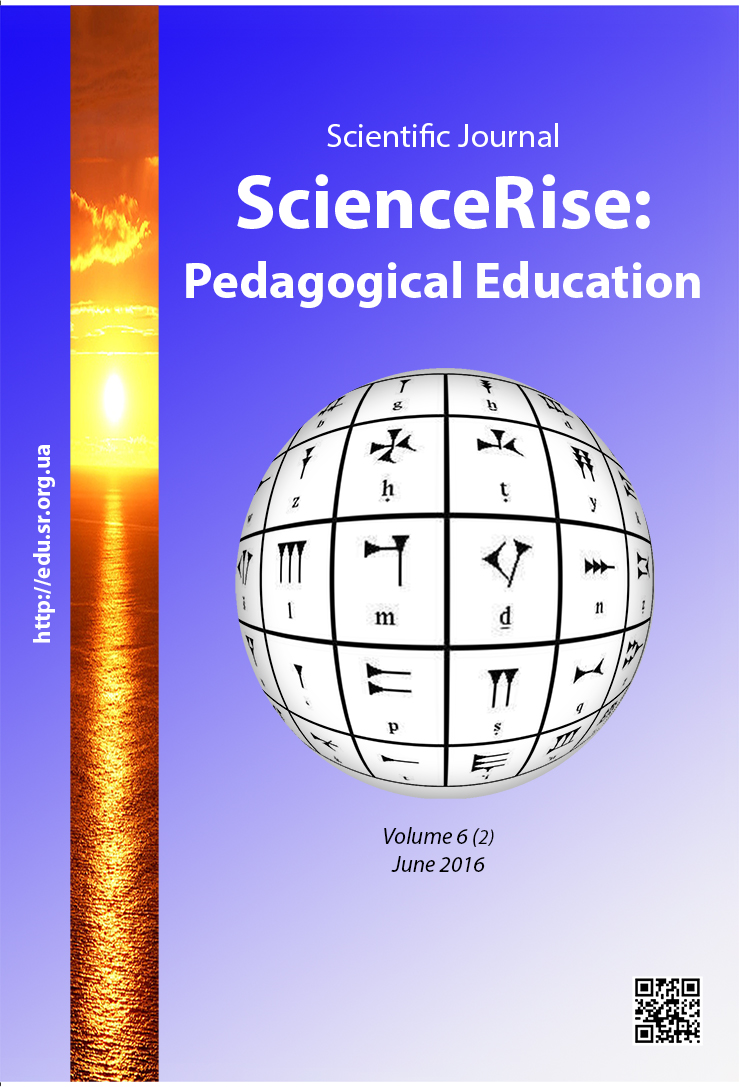Explication of the jewish child-rearing traditions in the principles of pedagogy of freedom
DOI:
https://doi.org/10.15587/2519-4984.2016.72810Keywords:
freedom pedagogy, principles of freedom pedagogy, the Jewish family, the Jewish tradition of upbringingAbstract
The article considers the author's view on the process of explication of the most characteristic for the Jewish national culture traditions of child-rearing in the principles of pedagogy of freedom. It is based on reconsidering, summarizing and comparing of the basic ideas of the Jewish child-rearing traditions based on the values of Judaism and identifying their basic ideas in the system of invarious principles which constitute the basis of the author's developed concept of pedagogy of freedom as a special direction of humanistic pedagogy. It views theoretical and practical bases of a personal inner freedom, its subjectivity, capability of conscious and responsible self-identification, independent choice and realization of the own life experience. Such comparison demonstrates fundamental Jewish education traditions in the principles of freedom pedagogy, their deep connection and it supports the idea that the pedagogy of freedom, not being a fully autonomous phenomenon, is genetically linked to the Jewish child-rearing traditions, which to some extent are focused on values of freedom
References
- Rastrygina, A. M. (2004). The development of the theory of free education in national and foreign pedagogy in late XIX – early XX century. Kyiv.
- Barylo, O. A. (2012). Modern Pedagogical Activity in the Context of the Ideas of the Theory of Free Upbringing (on the examples of nursery school work). Scientific Notes of Nizhyn State University named after M. Gogol, 12.
- Moskalenko, O. M. (2013). The idea of harmonic child education in the concept of philanthropy (the end of XVIII – the first half of the XIX century). Kirovograd, 20.
- Gerkerova, О. (2011). The idea of family education based on Jewish ethnopedagogy (late XIX – early XX century). Yalta, 20.
- UKRAINEJUDAICA: The truth about the ukrainian-russian relations (2010). Messiah committee. Available at: http://www.messcom.org.ua/2010/05/26/2593/
- Knoring, L. (2011). The Jewish phenomenon. Zametki po evrejskoj istorii, 11. Available at: http://berkovich-zametki.com/2011/Zametki/Nomer11/Knoring1.php
- Zhytomyrs’ka, T. M. (2013). Multicultural education of students at schools of general education in Ukrainian Podunavia (the second half of the XX century). Kirovograd, 20.
- Davidovich, N. (2014). Educational Challenges in a Multicultural Society: The Case of Israel. Modern tendencies in pedagogical education and science of Ukraine and Israil: the way to integration. Ariel, Israel.
- Chernova, L. (2002). Bridge over the precipice” (Family as a guardian of Jewish identity and the mirror of assimilation. The fate of Jewish spiritual and material heritage in the twentieth century. Kyiv: Judaica Institute.
- Meir, I. (2015). Jewish Family today. DAAT. Available at: http://www.daat.ac.il/daat/kitveyet/sde_chem
- Ginsberg, R. B. (2015). Children and freedom of choice. Migdal' Times, 129. Available at: http://www.migdal.org.ua/times/129/29992
- Solberg, S. (2015). Psychological sight on Jewish upbringing. DAAT. 2015. Abailable at: http://www.daat.ac.il/daat/kitveyet/sde_chem/solberg.htm
- Feller, M. (2010). The truth about Ukrainian-Jewish relations. Messiah committee.
Downloads
Published
How to Cite
Issue
Section
License
Copyright (c) 2016 Alla Mykolayivna Rastrygina

This work is licensed under a Creative Commons Attribution 4.0 International License.
Our journal abides by the Creative Commons CC BY copyright rights and permissions for open access journals.
Authors, who are published in this journal, agree to the following conditions:
1. The authors reserve the right to authorship of the work and pass the first publication right of this work to the journal under the terms of a Creative Commons CC BY, which allows others to freely distribute the published research with the obligatory reference to the authors of the original work and the first publication of the work in this journal.
2. The authors have the right to conclude separate supplement agreements that relate to non-exclusive work distribution in the form in which it has been published by the journal (for example, to upload the work to the online storage of the journal or publish it as part of a monograph), provided that the reference to the first publication of the work in this journal is included.








